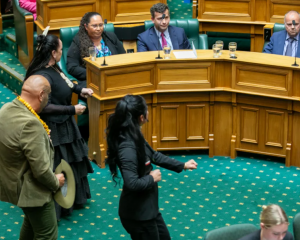The advantages of learning more than one language are well known.
Not only does learning a second language contribute to a wider cultural understanding and open up opportunities in terms of travel and work, but learning the fundamentals of grammar is a great way to become more proficient in one's first language, too.
New Zealand schools have historically taught European languages, with French, German and Latin popular options.
Japanese has become more commonly taught.
And there is an increasing focus on Maori and Pacific languages in the curriculum and through national language weeks.
But the numbers of pupils actively choosing to study another language at school have dramatically reduced, and now only about one in five pupils studies another language. Access and attitude are likely to dictate choice.
Schools may only offer a handful of options dictated by the teaching skills available and demand from pupils.
Many people believe English is widely spoken so New Zealanders can get away without learning another language even if they plan to travel.
Others believe visitors and foreign migrants to our country should learn our native tongue, so there is even less need to learn another.
Sadly, that reasoning not only reduces personal opportunities, it will increasingly prove a barrier to our socio-economic progress, too.
For our fast-changing world means more international interaction than ever.
The global marketplace is providing opportunities for a range of different alliances: military and trade agreements, tourism opportunities and sister city partnerships.
And traditional physical borders have largely broken down in the online environment.
As China continues to develop as a major world player, there are huge opportunities emerging in relation to that nation alone.
It is with this in mind that the Government has established an Asian Language Learning in Schools programme, to help schools set up new, or strengthen existing, Asian language learning programmes, and particularly encouraging a pathway from primary to secondary school learning.
It is pleasing to see 13 Dunedin schools are among those to realise the potential and seize the opportunities, and have been rewarded with inclusion in the first round of contestable funding, to teach Mandarin - currently available at fewer than 40 schools nationwide.
Those children are highly likely to reap the rewards of their teachers' foresight.
There will be great travel possibilities, but they are likely to have their pick of career opportunities at home, too.
For recent tourism projections show international visitor numbers are expected to increase from 2.9 million in the year which ended in March, to 3.8 million in 2021.
The numbers are expected to help fuel a 46% increase in tourism jobs in Otago alone in the next 10 years.
Nationally, some 36,000 full-time equivalent workers are expected to be needed.
And, with Chinese rapidly set to overtake Australians as our largest international visitor demographic, people with cultural and language skills will be in demand - whether they are accommodation managers, hospitality workers, chefs, waiters and baristas, or retailers, taxi drivers, tour guides and translators.
And, with one in three permanent migrants now coming from either China or India, the need for language and cultural skills in a variety of arenas - business, retail, real estate, medical, national and local government - becomes more important too.
One of the biggest challenges is likely to be upskilling our teachers with the foreign language skills necessary to educate our next generation.
But it is vital we do so, for education not only opens the mind, it opens numerous doors, too - but only if we can provide our children with skills that will translate well in the real world.











